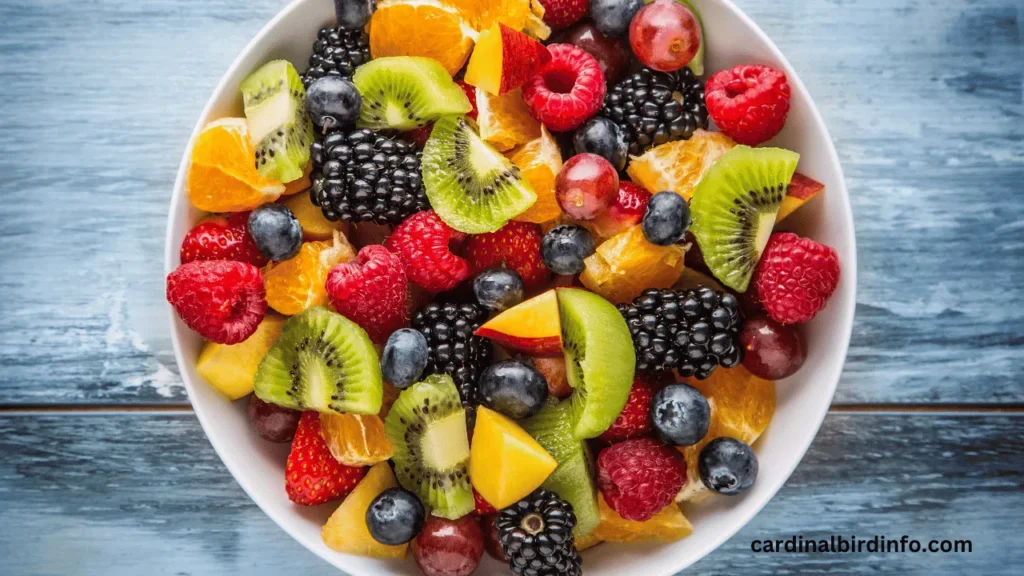In the tranquil embrace of a sun-drenched morning, a brilliant cardinal flits between the branches of a fruit tree, its vibrant red feathers contrasting starkly against the lush green leaves.
As it perches delicately, it begins pecking at a ripe berry, showcasing a behavior that piques the curiosity of nature lovers and bird watchers alike.
This enchanting scene not only captivates the observer but also raises a thought-provoking question: Do cardinals truly eat fruit? Understanding their dietary habits sheds light on the adaptability of these beautiful birds and highlights the importance of our natural ecosystems.
While it’s common knowledge that cardinals are primarily insectivores, relying heavily on insects for sustenance, they also have a remarkable penchant for fruit, especially during specific seasons or when other food sources are limited.
In this blog post, we will delve into the intricacies of cardinals’ diets, examining the nutritional benefits fruit provides and the various types of fruit that attract these striking birds.
We will also explore the factors that influence their fruit consumption, offering insights that could help both bird enthusiasts and gardeners create more inviting environments for these captivating creatures.
So, if you’ve ever wondered about the diet of cardinals and the role fruit plays in their survival, you’re in for an enlightening journey. From understanding the significance of insects to exploring the colorful array of fruit that delights their palate, we’ll uncover the secrets behind these remarkable avian foragers.
Let’s embark on this exploration of cardinals and their surprising relationship with fruit.

Contents
Cardinals as Primarily Insectivores
Cardinals are primarily known as insectivores, meaning that insects form a significant portion of their diet. Insects provide essential nutrients such as protein and fat, which are crucial for their growth and reproductive success.
Their foraging behaviors are fascinating; they actively hunt for insects by moving through the underbrush and looking under leaves. Preferred habitats include wooded areas, gardens, and even backyards where they can easily spot their prey.
The Benefits of Fruit for Cardinals
While insects are vital, fruit also plays an important role in the diet of cardinals. Fruits are packed with vitamins, minerals, and antioxidants that help boost the birds’ immune systems and overall health.
During the breeding season or when insect populations dwindle, fruit becomes an invaluable supplement to their diet, offering a convenient source of energy and nutrition.
Types of Fruit Cardinals Eat
Cardinals have a wide array of fruits they enjoy consuming. They are known to feast on native berries like blackberries, blueberries, and holly berries, as well as introduced species like grapes and cherries.
Their fruit preferences can vary, influenced by factors such as size, color, and sweetness, often opting for the ripest and most nutritious offerings available.

Factors Influencing Fruit Consumption
The availability of fruit changes with the seasons, significantly influencing cardinals’ diets. During spring and summer, when many fruits ripen, cardinals take advantage of these plentiful resources.
Habitat also plays a crucial role, as forests and suburban areas provide varying levels of access to fruit-bearing plants. Furthermore, competition with other bird species and potential predators can impact a cardinal’s ability to reach their favorite fruits.
Fruit-Related Behaviors
Cardinals exhibit unique behaviors when interacting with fruit trees. Their foraging techniques include pecking, plucking, and swallowing fruits whole, showcasing their adaptability in acquiring food.
Interestingly, fruit-bearing trees can also serve as territory markers, where cardinals may defend their feeding grounds from intruders, enhancing their reproductive success.
Conclusion
In summary, while cardinals are primarily insectivores, their occasional consumption of fruit reveals a fascinating aspect of their dietary habits.
The nutritional benefits fruit provides are crucial, especially during times when insects are scarce. As we have seen, the interplay between seasonal changes, habitat, and competition significantly influences their dietary choices.
Ultimately, understanding that cardinals can thrive on a diet that includes both insects and fruit enriches our appreciation for these stunning birds.
The next time you spot a cardinal in your yard, remember the complexities of its diet, and perhaps consider planting some fruit-bearing plants to attract these beautiful visitors. In doing so, you not only provide a feast for these delightful birds but also contribute to the rich tapestry of life in your local ecosystem.
1. Do cardinals only eat fruit?
No, cardinals are primarily insectivores, meaning they mainly consume insects. However, they do eat fruit, especially during certain seasons or when insects are scarce.
2. What types of fruit do cardinals like?
Cardinals enjoy a variety of fruits, including berries like blackberries, blueberries, and strawberries, as well as grapes, cherries, and even seeds from sunflowers. They are attracted to ripe, colorful fruits that are easy to access.
3. Why do cardinals eat fruit?
Fruits provide essential nutrients, including vitamins, minerals, and antioxidants. They are particularly beneficial during the breeding season and can supplement their diet when insect availability is low.
4. When do cardinals eat fruit?
Cardinals tend to eat fruit more during the spring and summer when many fruits are in season. They adjust their diet based on the availability of food sources throughout the year.
5. How do cardinals find fruit?
Cardinals use their excellent vision to spot ripe fruits from a distance. They often forage in trees and shrubs, using their strong beaks to pluck fruits and seeds.
6. Can feeding cardinals fruit help them?
Yes! Providing fruits such as berries or seed mixes can help support cardinals, especially in urban environments where natural food sources may be limited. Just ensure any fruit is fresh and safe for birds.








